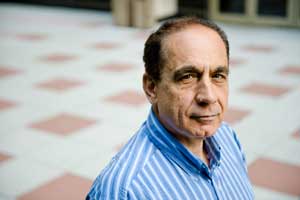
Photo by Ryan Brenizer
To be sure, Spyros Efthimiades, Ph.D., can testify to the old expression, use it or lose it.
The associate professor of physics, who teaches adult education at Fordham College of Liberal Studies (FCLS), also can testify to the fact that teaching older students requires a different paradigm than one applied to instructing 18 year olds who have not yet set foot in what he calls the “real world.”
“Adult students bring their responsibilities right into the class,” said Efthimiades, who teaches Perspectives: Physics and other courses to non-physics major adult students in FCLS. “They have jobs and homes and families. [Going back to] school is not a single effort for them. They’ve worked all day, made money, paid the mortgage, and now they’re taking time out to come and do this. And so the education is quite valued.”
Efthimiades’ evening classes on the Lincoln Center campus typically draw between 10 and 15 students whose average age is somewhere in the mid-30s, he said. Often, their desire to get a bachelor’s degree after many years in the workforce is the result of feeling that they’d missed something when they were younger.
“Many of them could not go to college for some reason or another,” he said. “They come with a real longing to find out what a college education is all about. And what they find out is they discover themselves. Having lived and worked in the outside world, nothing in their experience has come close to the sharpening of academic skills, the new perceptions, the intellectual stimulation, the intrinsic value of learning. For them, it’s magic.”
One of the most important aspects of teaching adult students, according to Efthimiades, is to take nothing for granted. While teenage freshmen enter with roughly the same level of pre-college curriculum from high school and a habitual pattern of school attendance, adult students bring wildly diverse experiences, ages, habits and education levels to the same class.
For these reasons, Efthimiades said that he promptly seeks some sort of marker that provides an indication of the individual learning levels within a class.
“I don’t wait for the mid-term exam,” he said, “The adult student, more than the young student, needs to receive early feedback to know where he or she is going, so I provide them with more exams, stimulus and interaction.”
Giving a series of smaller exams spread over the semester helps him “fine-tune” the students’ individual situations. It also helps build confidence, which Efthimiades said could be an issue with many returning to school after years.
“Adult students want to receive gratification for their efforts,” he said.
Efthimiades, who has been teaching adults for more than two decades, fell into adult education quite by accident. As a doctoral candidate at the City College of New York, he worked as a physics and math lecturer in the evening program, where he found many adults taking math for the second time and facing a subject they were “terrified of.” Efthimiades loved the challenge of explaining things that the older students thought they would never understand.
“A lot of graduate students don’t have this experience,” he said. “Usually in graduate school you are isolated from the real world, without a clue as to what that [working]world is all about.”
With the swell of retiring baby boomers and an increasing and diverse immigrant population, adult education in the United States is experiencing steady growth. This fall, FCLS, which serves about 850 students and offers more than 30 majors, welcomes students to Fordham’s new Westchester campus facility. There, those challenges facing teachers of adult learners continue, Efthimiades said.
But the rewards, he added, will always be the same.
“You see the anguish,” he said. “But then you see the triumph.”
– Janet Sassi
